Residential Care Services: Healthcare, Safety, and Quality Analysis
VerifiedAdded on 2023/04/07
|11
|1567
|71
Report
AI Summary
This report provides a detailed analysis of residential care services, exploring their effectiveness in ensuring safety and quality for residents. It examines the role of healthcare technologies, such as telehealth, in connecting residential care services with larger hospitals and expert physicians, enabling prompt and expert medical interventions. The report highlights the importance of legislative frameworks, such as the Care Standards Act 2000 and the Regulation of Care Act 2001, in establishing regulatory frameworks for all types of care homes. It also emphasizes the significance of effective risk management, including security, fire, and occupational health, in preventing accidents and infections. The report further discusses the training of healthcare professionals to manage various hazards, the emphasis on therapeutic relationship-building between nursing professionals and residents, and the encouragement of continuous professional development through training. Finally, it underscores the importance of multi-disciplinary teamwork, involving physiotherapists, occupational therapists, and other specialists, in meeting the varied needs of aged patients and providing patient-centered collaborative care.
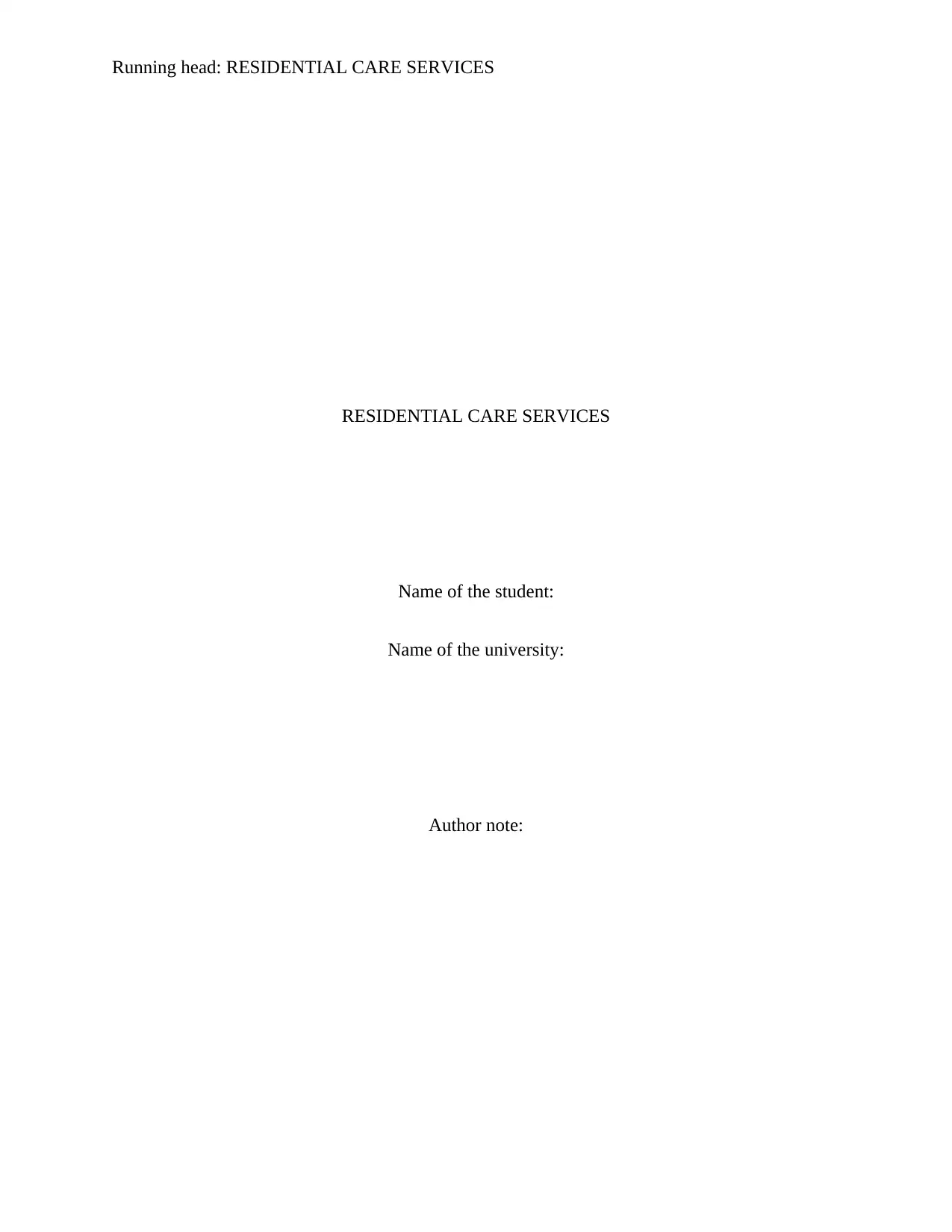
Running head: RESIDENTIAL CARE SERVICES
RESIDENTIAL CARE SERVICES
Name of the student:
Name of the university:
Author note:
RESIDENTIAL CARE SERVICES
Name of the student:
Name of the university:
Author note:
Paraphrase This Document
Need a fresh take? Get an instant paraphrase of this document with our AI Paraphraser
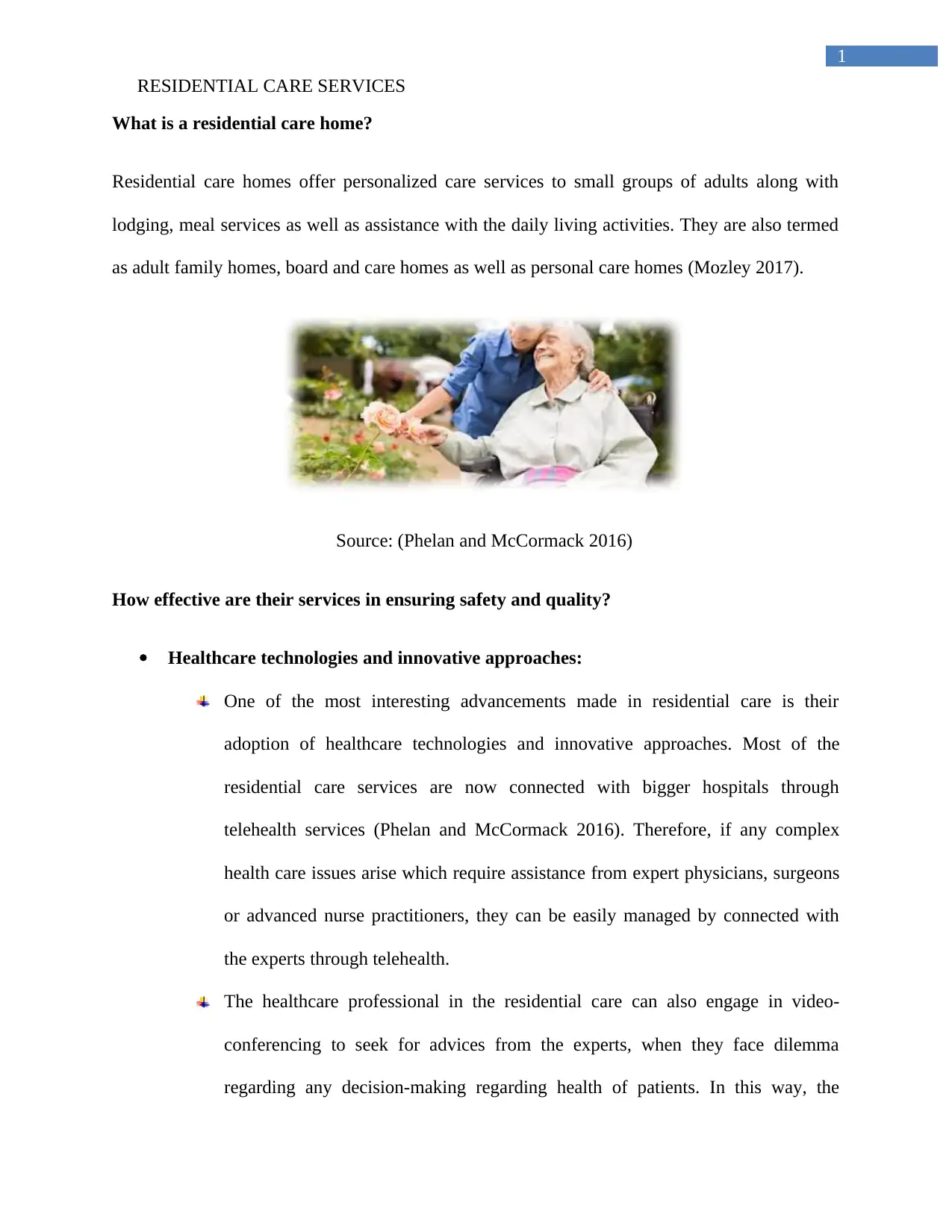
1
RESIDENTIAL CARE SERVICES
What is a residential care home?
Residential care homes offer personalized care services to small groups of adults along with
lodging, meal services as well as assistance with the daily living activities. They are also termed
as adult family homes, board and care homes as well as personal care homes (Mozley 2017).
Source: (Phelan and McCormack 2016)
How effective are their services in ensuring safety and quality?
Healthcare technologies and innovative approaches:
One of the most interesting advancements made in residential care is their
adoption of healthcare technologies and innovative approaches. Most of the
residential care services are now connected with bigger hospitals through
telehealth services (Phelan and McCormack 2016). Therefore, if any complex
health care issues arise which require assistance from expert physicians, surgeons
or advanced nurse practitioners, they can be easily managed by connected with
the experts through telehealth.
The healthcare professional in the residential care can also engage in video-
conferencing to seek for advices from the experts, when they face dilemma
regarding any decision-making regarding health of patients. In this way, the
RESIDENTIAL CARE SERVICES
What is a residential care home?
Residential care homes offer personalized care services to small groups of adults along with
lodging, meal services as well as assistance with the daily living activities. They are also termed
as adult family homes, board and care homes as well as personal care homes (Mozley 2017).
Source: (Phelan and McCormack 2016)
How effective are their services in ensuring safety and quality?
Healthcare technologies and innovative approaches:
One of the most interesting advancements made in residential care is their
adoption of healthcare technologies and innovative approaches. Most of the
residential care services are now connected with bigger hospitals through
telehealth services (Phelan and McCormack 2016). Therefore, if any complex
health care issues arise which require assistance from expert physicians, surgeons
or advanced nurse practitioners, they can be easily managed by connected with
the experts through telehealth.
The healthcare professional in the residential care can also engage in video-
conferencing to seek for advices from the experts, when they face dilemma
regarding any decision-making regarding health of patients. In this way, the
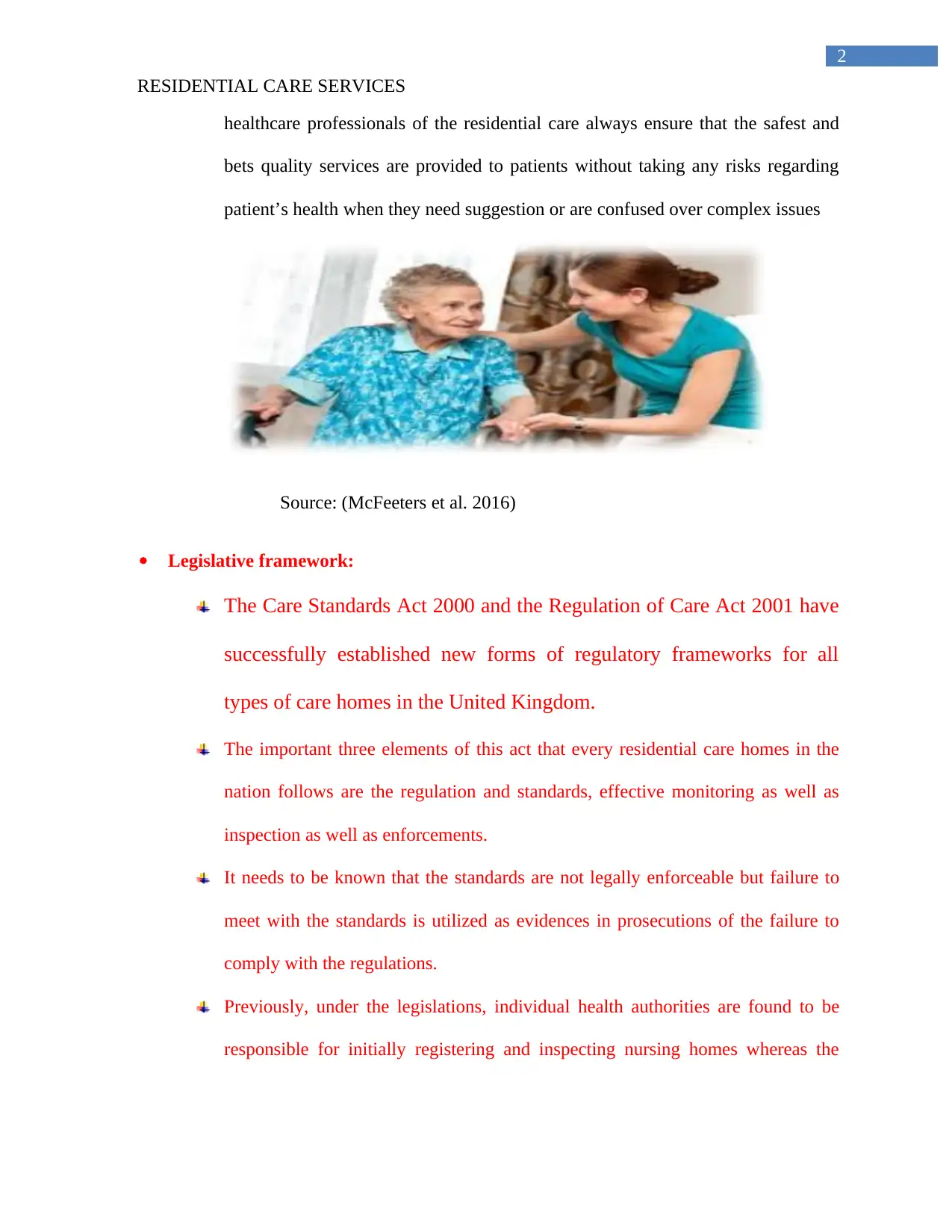
2
RESIDENTIAL CARE SERVICES
healthcare professionals of the residential care always ensure that the safest and
bets quality services are provided to patients without taking any risks regarding
patient’s health when they need suggestion or are confused over complex issues
Source: (McFeeters et al. 2016)
Legislative framework:
The Care Standards Act 2000 and the Regulation of Care Act 2001 have
successfully established new forms of regulatory frameworks for all
types of care homes in the United Kingdom.
The important three elements of this act that every residential care homes in the
nation follows are the regulation and standards, effective monitoring as well as
inspection as well as enforcements.
It needs to be known that the standards are not legally enforceable but failure to
meet with the standards is utilized as evidences in prosecutions of the failure to
comply with the regulations.
Previously, under the legislations, individual health authorities are found to be
responsible for initially registering and inspecting nursing homes whereas the
RESIDENTIAL CARE SERVICES
healthcare professionals of the residential care always ensure that the safest and
bets quality services are provided to patients without taking any risks regarding
patient’s health when they need suggestion or are confused over complex issues
Source: (McFeeters et al. 2016)
Legislative framework:
The Care Standards Act 2000 and the Regulation of Care Act 2001 have
successfully established new forms of regulatory frameworks for all
types of care homes in the United Kingdom.
The important three elements of this act that every residential care homes in the
nation follows are the regulation and standards, effective monitoring as well as
inspection as well as enforcements.
It needs to be known that the standards are not legally enforceable but failure to
meet with the standards is utilized as evidences in prosecutions of the failure to
comply with the regulations.
Previously, under the legislations, individual health authorities are found to be
responsible for initially registering and inspecting nursing homes whereas the
⊘ This is a preview!⊘
Do you want full access?
Subscribe today to unlock all pages.

Trusted by 1+ million students worldwide
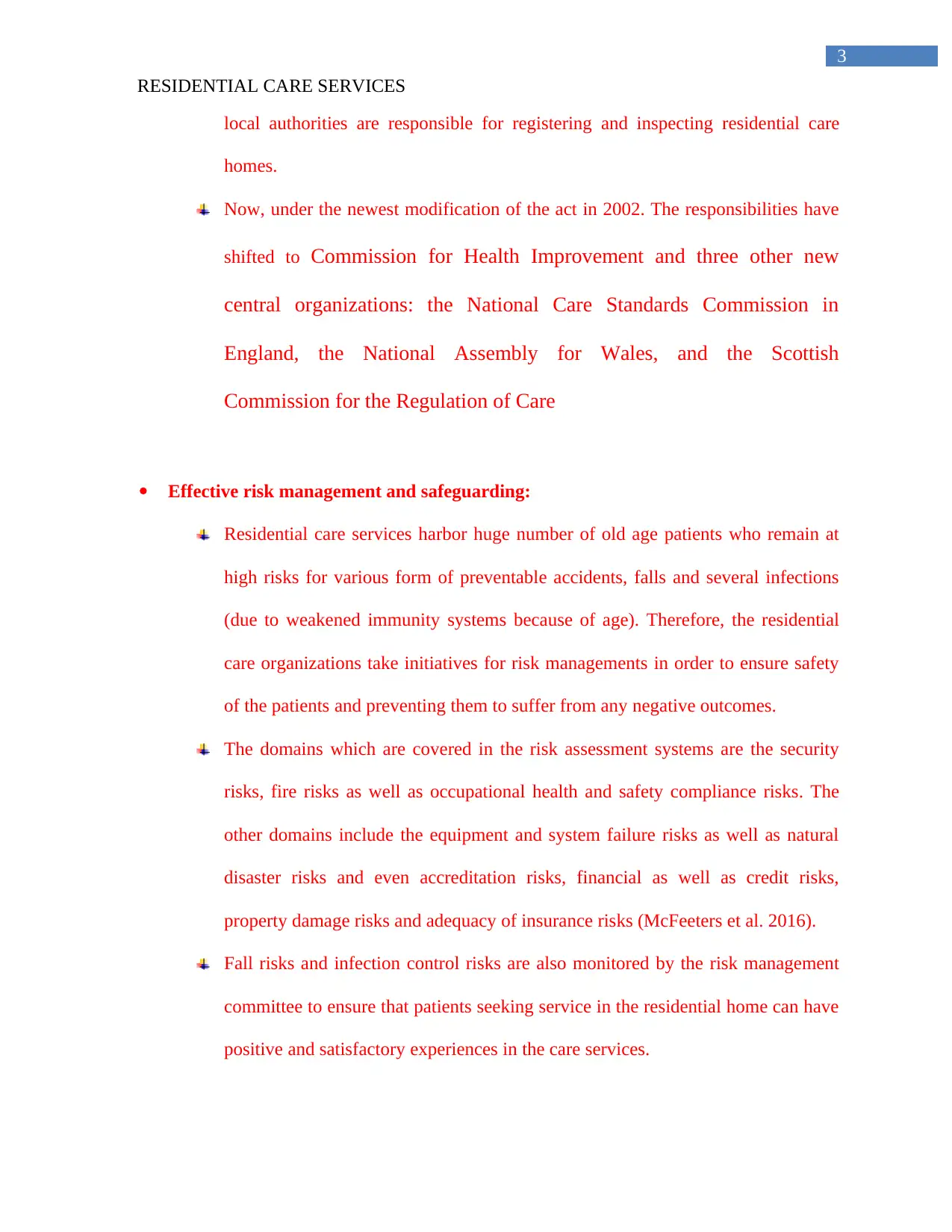
3
RESIDENTIAL CARE SERVICES
local authorities are responsible for registering and inspecting residential care
homes.
Now, under the newest modification of the act in 2002. The responsibilities have
shifted to Commission for Health Improvement and three other new
central organizations: the National Care Standards Commission in
England, the National Assembly for Wales, and the Scottish
Commission for the Regulation of Care
Effective risk management and safeguarding:
Residential care services harbor huge number of old age patients who remain at
high risks for various form of preventable accidents, falls and several infections
(due to weakened immunity systems because of age). Therefore, the residential
care organizations take initiatives for risk managements in order to ensure safety
of the patients and preventing them to suffer from any negative outcomes.
The domains which are covered in the risk assessment systems are the security
risks, fire risks as well as occupational health and safety compliance risks. The
other domains include the equipment and system failure risks as well as natural
disaster risks and even accreditation risks, financial as well as credit risks,
property damage risks and adequacy of insurance risks (McFeeters et al. 2016).
Fall risks and infection control risks are also monitored by the risk management
committee to ensure that patients seeking service in the residential home can have
positive and satisfactory experiences in the care services.
RESIDENTIAL CARE SERVICES
local authorities are responsible for registering and inspecting residential care
homes.
Now, under the newest modification of the act in 2002. The responsibilities have
shifted to Commission for Health Improvement and three other new
central organizations: the National Care Standards Commission in
England, the National Assembly for Wales, and the Scottish
Commission for the Regulation of Care
Effective risk management and safeguarding:
Residential care services harbor huge number of old age patients who remain at
high risks for various form of preventable accidents, falls and several infections
(due to weakened immunity systems because of age). Therefore, the residential
care organizations take initiatives for risk managements in order to ensure safety
of the patients and preventing them to suffer from any negative outcomes.
The domains which are covered in the risk assessment systems are the security
risks, fire risks as well as occupational health and safety compliance risks. The
other domains include the equipment and system failure risks as well as natural
disaster risks and even accreditation risks, financial as well as credit risks,
property damage risks and adequacy of insurance risks (McFeeters et al. 2016).
Fall risks and infection control risks are also monitored by the risk management
committee to ensure that patients seeking service in the residential home can have
positive and satisfactory experiences in the care services.
Paraphrase This Document
Need a fresh take? Get an instant paraphrase of this document with our AI Paraphraser
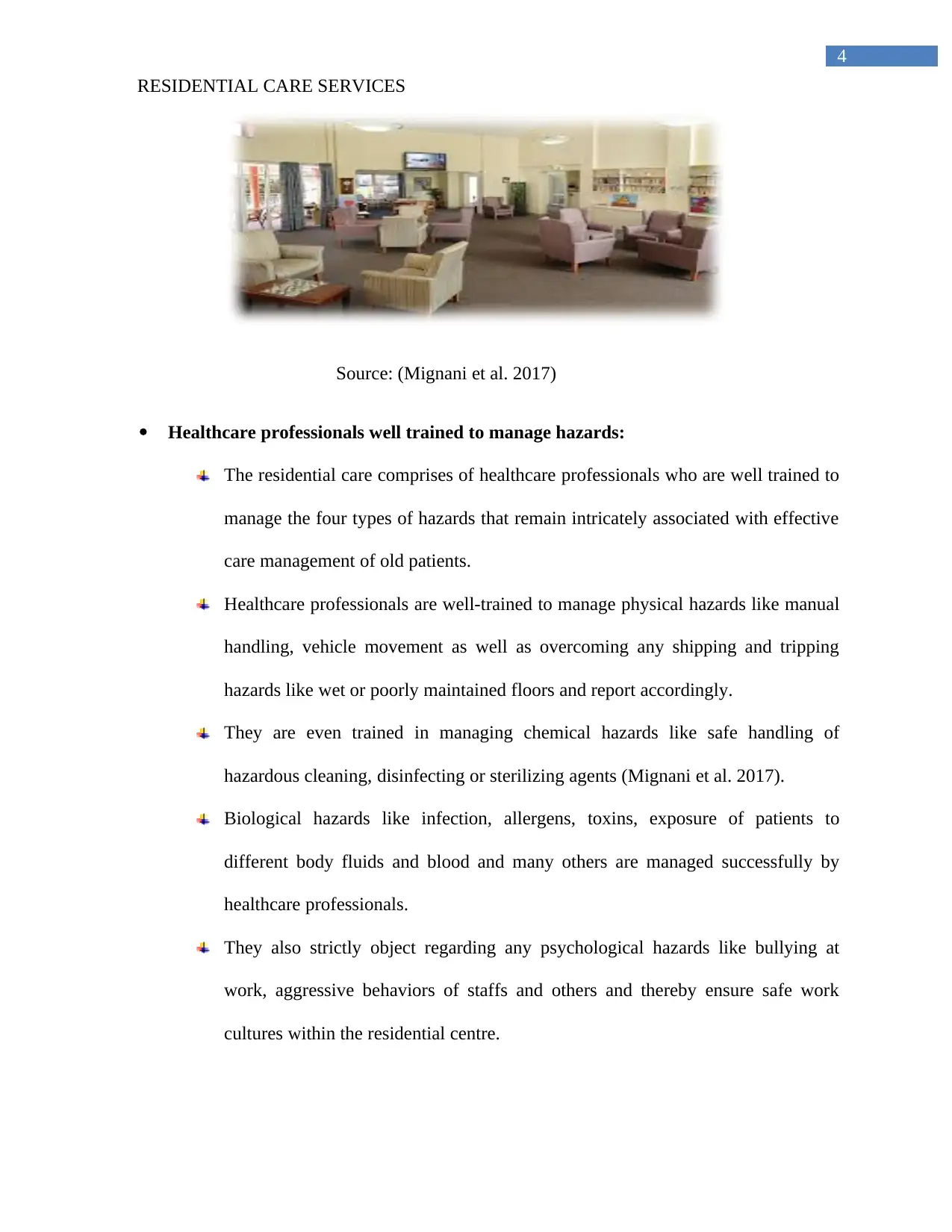
4
RESIDENTIAL CARE SERVICES
Source: (Mignani et al. 2017)
Healthcare professionals well trained to manage hazards:
The residential care comprises of healthcare professionals who are well trained to
manage the four types of hazards that remain intricately associated with effective
care management of old patients.
Healthcare professionals are well-trained to manage physical hazards like manual
handling, vehicle movement as well as overcoming any shipping and tripping
hazards like wet or poorly maintained floors and report accordingly.
They are even trained in managing chemical hazards like safe handling of
hazardous cleaning, disinfecting or sterilizing agents (Mignani et al. 2017).
Biological hazards like infection, allergens, toxins, exposure of patients to
different body fluids and blood and many others are managed successfully by
healthcare professionals.
They also strictly object regarding any psychological hazards like bullying at
work, aggressive behaviors of staffs and others and thereby ensure safe work
cultures within the residential centre.
RESIDENTIAL CARE SERVICES
Source: (Mignani et al. 2017)
Healthcare professionals well trained to manage hazards:
The residential care comprises of healthcare professionals who are well trained to
manage the four types of hazards that remain intricately associated with effective
care management of old patients.
Healthcare professionals are well-trained to manage physical hazards like manual
handling, vehicle movement as well as overcoming any shipping and tripping
hazards like wet or poorly maintained floors and report accordingly.
They are even trained in managing chemical hazards like safe handling of
hazardous cleaning, disinfecting or sterilizing agents (Mignani et al. 2017).
Biological hazards like infection, allergens, toxins, exposure of patients to
different body fluids and blood and many others are managed successfully by
healthcare professionals.
They also strictly object regarding any psychological hazards like bullying at
work, aggressive behaviors of staffs and others and thereby ensure safe work
cultures within the residential centre.
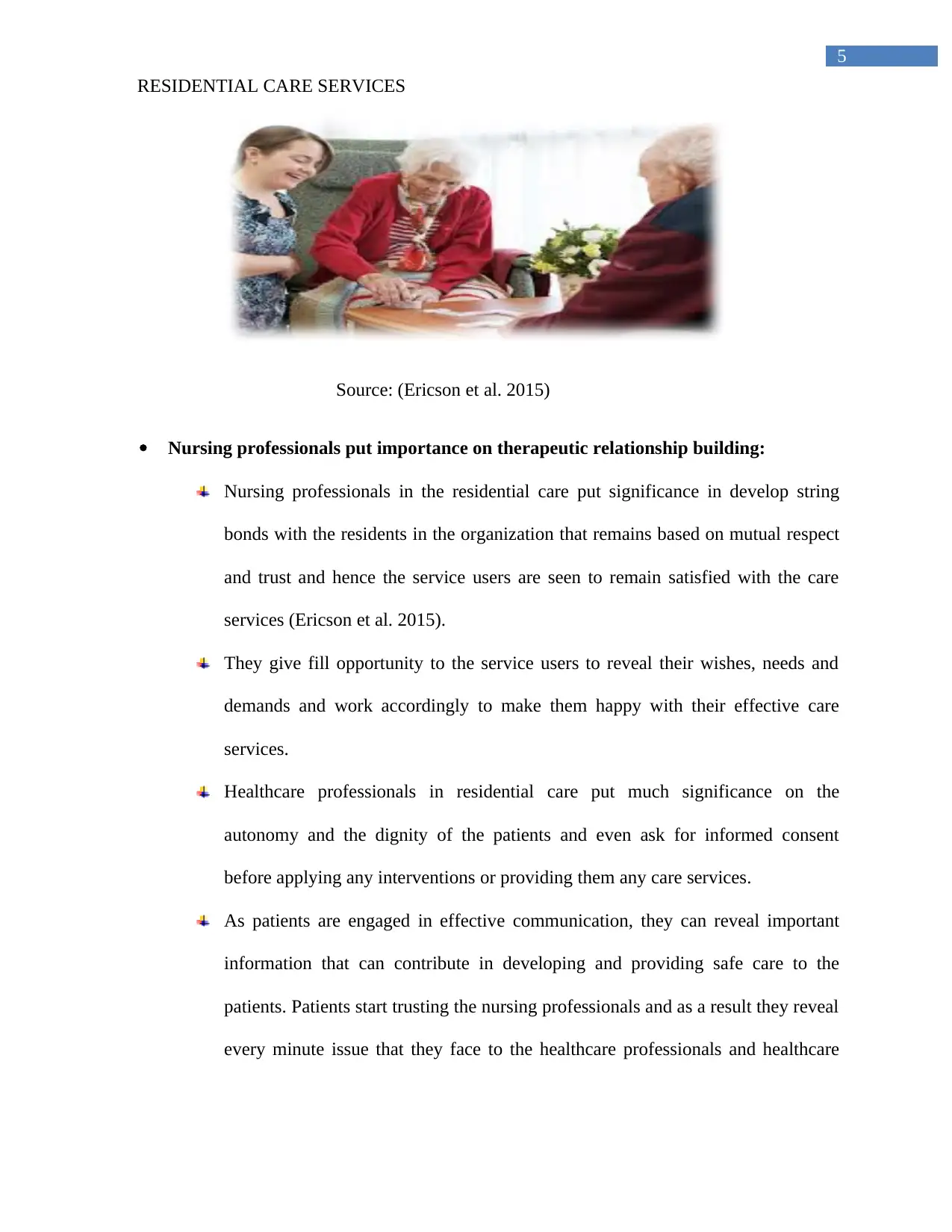
5
RESIDENTIAL CARE SERVICES
Source: (Ericson et al. 2015)
Nursing professionals put importance on therapeutic relationship building:
Nursing professionals in the residential care put significance in develop string
bonds with the residents in the organization that remains based on mutual respect
and trust and hence the service users are seen to remain satisfied with the care
services (Ericson et al. 2015).
They give fill opportunity to the service users to reveal their wishes, needs and
demands and work accordingly to make them happy with their effective care
services.
Healthcare professionals in residential care put much significance on the
autonomy and the dignity of the patients and even ask for informed consent
before applying any interventions or providing them any care services.
As patients are engaged in effective communication, they can reveal important
information that can contribute in developing and providing safe care to the
patients. Patients start trusting the nursing professionals and as a result they reveal
every minute issue that they face to the healthcare professionals and healthcare
RESIDENTIAL CARE SERVICES
Source: (Ericson et al. 2015)
Nursing professionals put importance on therapeutic relationship building:
Nursing professionals in the residential care put significance in develop string
bonds with the residents in the organization that remains based on mutual respect
and trust and hence the service users are seen to remain satisfied with the care
services (Ericson et al. 2015).
They give fill opportunity to the service users to reveal their wishes, needs and
demands and work accordingly to make them happy with their effective care
services.
Healthcare professionals in residential care put much significance on the
autonomy and the dignity of the patients and even ask for informed consent
before applying any interventions or providing them any care services.
As patients are engaged in effective communication, they can reveal important
information that can contribute in developing and providing safe care to the
patients. Patients start trusting the nursing professionals and as a result they reveal
every minute issue that they face to the healthcare professionals and healthcare
⊘ This is a preview!⊘
Do you want full access?
Subscribe today to unlock all pages.

Trusted by 1+ million students worldwide
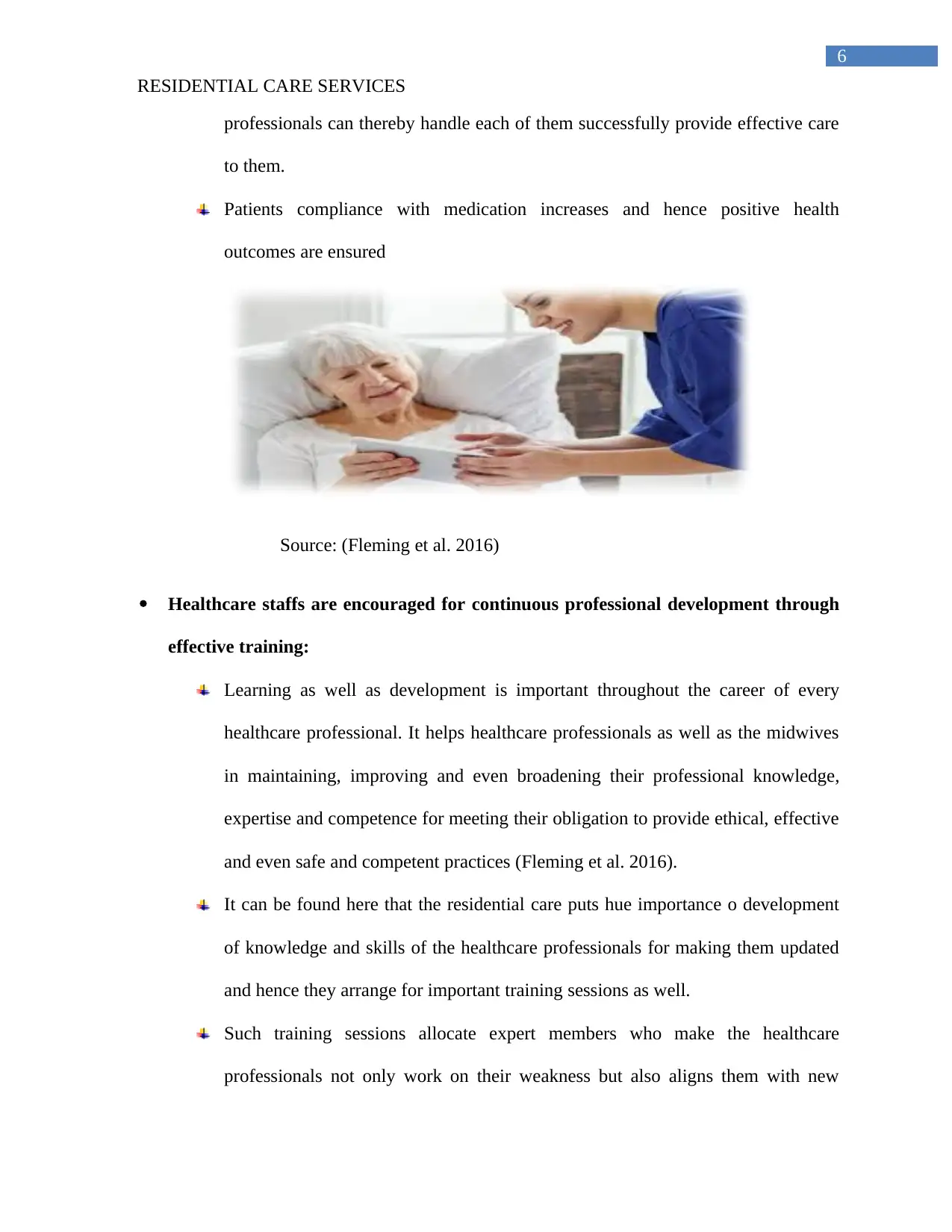
6
RESIDENTIAL CARE SERVICES
professionals can thereby handle each of them successfully provide effective care
to them.
Patients compliance with medication increases and hence positive health
outcomes are ensured
Source: (Fleming et al. 2016)
Healthcare staffs are encouraged for continuous professional development through
effective training:
Learning as well as development is important throughout the career of every
healthcare professional. It helps healthcare professionals as well as the midwives
in maintaining, improving and even broadening their professional knowledge,
expertise and competence for meeting their obligation to provide ethical, effective
and even safe and competent practices (Fleming et al. 2016).
It can be found here that the residential care puts hue importance o development
of knowledge and skills of the healthcare professionals for making them updated
and hence they arrange for important training sessions as well.
Such training sessions allocate expert members who make the healthcare
professionals not only work on their weakness but also aligns them with new
RESIDENTIAL CARE SERVICES
professionals can thereby handle each of them successfully provide effective care
to them.
Patients compliance with medication increases and hence positive health
outcomes are ensured
Source: (Fleming et al. 2016)
Healthcare staffs are encouraged for continuous professional development through
effective training:
Learning as well as development is important throughout the career of every
healthcare professional. It helps healthcare professionals as well as the midwives
in maintaining, improving and even broadening their professional knowledge,
expertise and competence for meeting their obligation to provide ethical, effective
and even safe and competent practices (Fleming et al. 2016).
It can be found here that the residential care puts hue importance o development
of knowledge and skills of the healthcare professionals for making them updated
and hence they arrange for important training sessions as well.
Such training sessions allocate expert members who make the healthcare
professionals not only work on their weakness but also aligns them with new
Paraphrase This Document
Need a fresh take? Get an instant paraphrase of this document with our AI Paraphraser
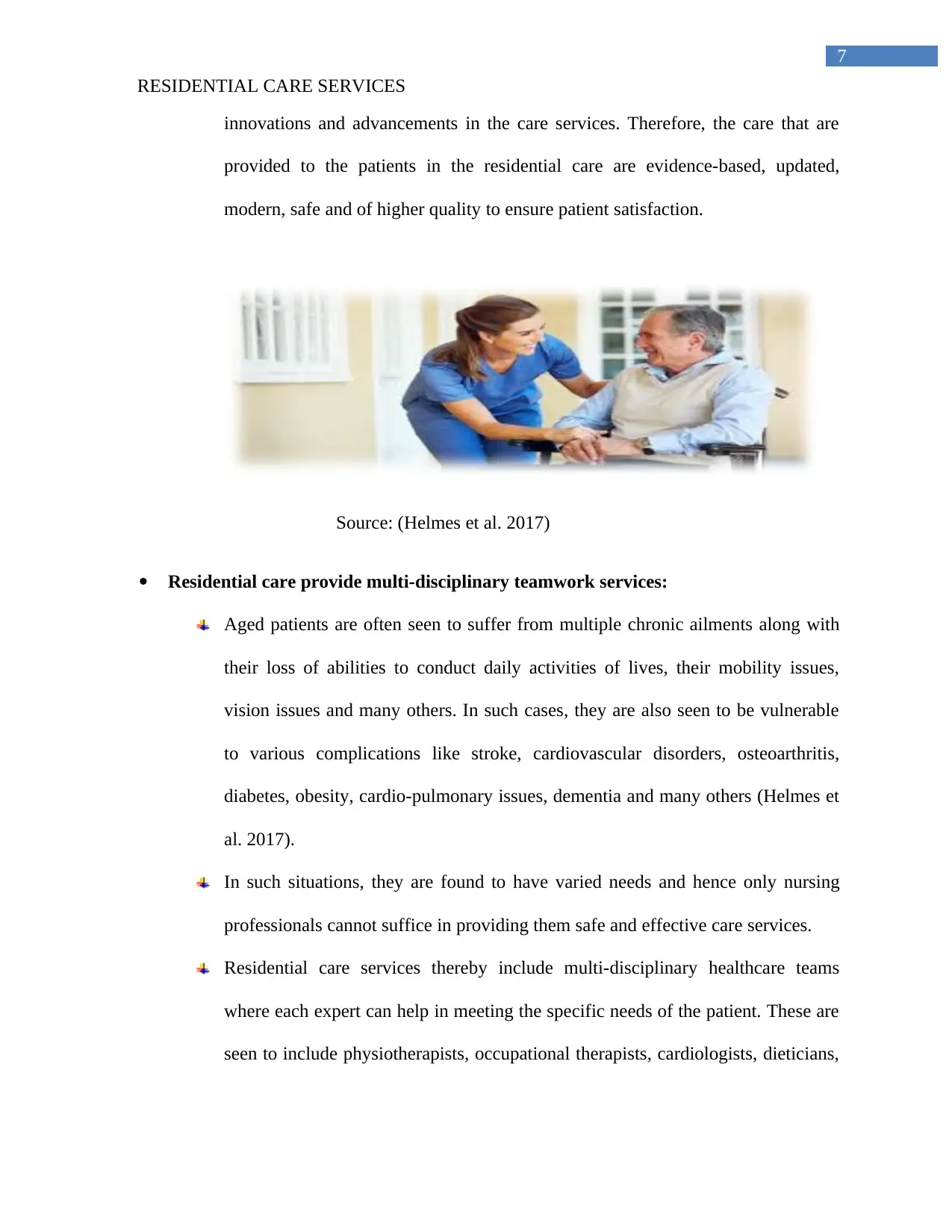
7
RESIDENTIAL CARE SERVICES
innovations and advancements in the care services. Therefore, the care that are
provided to the patients in the residential care are evidence-based, updated,
modern, safe and of higher quality to ensure patient satisfaction.
Source: (Helmes et al. 2017)
Residential care provide multi-disciplinary teamwork services:
Aged patients are often seen to suffer from multiple chronic ailments along with
their loss of abilities to conduct daily activities of lives, their mobility issues,
vision issues and many others. In such cases, they are also seen to be vulnerable
to various complications like stroke, cardiovascular disorders, osteoarthritis,
diabetes, obesity, cardio-pulmonary issues, dementia and many others (Helmes et
al. 2017).
In such situations, they are found to have varied needs and hence only nursing
professionals cannot suffice in providing them safe and effective care services.
Residential care services thereby include multi-disciplinary healthcare teams
where each expert can help in meeting the specific needs of the patient. These are
seen to include physiotherapists, occupational therapists, cardiologists, dieticians,
RESIDENTIAL CARE SERVICES
innovations and advancements in the care services. Therefore, the care that are
provided to the patients in the residential care are evidence-based, updated,
modern, safe and of higher quality to ensure patient satisfaction.
Source: (Helmes et al. 2017)
Residential care provide multi-disciplinary teamwork services:
Aged patients are often seen to suffer from multiple chronic ailments along with
their loss of abilities to conduct daily activities of lives, their mobility issues,
vision issues and many others. In such cases, they are also seen to be vulnerable
to various complications like stroke, cardiovascular disorders, osteoarthritis,
diabetes, obesity, cardio-pulmonary issues, dementia and many others (Helmes et
al. 2017).
In such situations, they are found to have varied needs and hence only nursing
professionals cannot suffice in providing them safe and effective care services.
Residential care services thereby include multi-disciplinary healthcare teams
where each expert can help in meeting the specific needs of the patient. These are
seen to include physiotherapists, occupational therapists, cardiologists, dieticians,
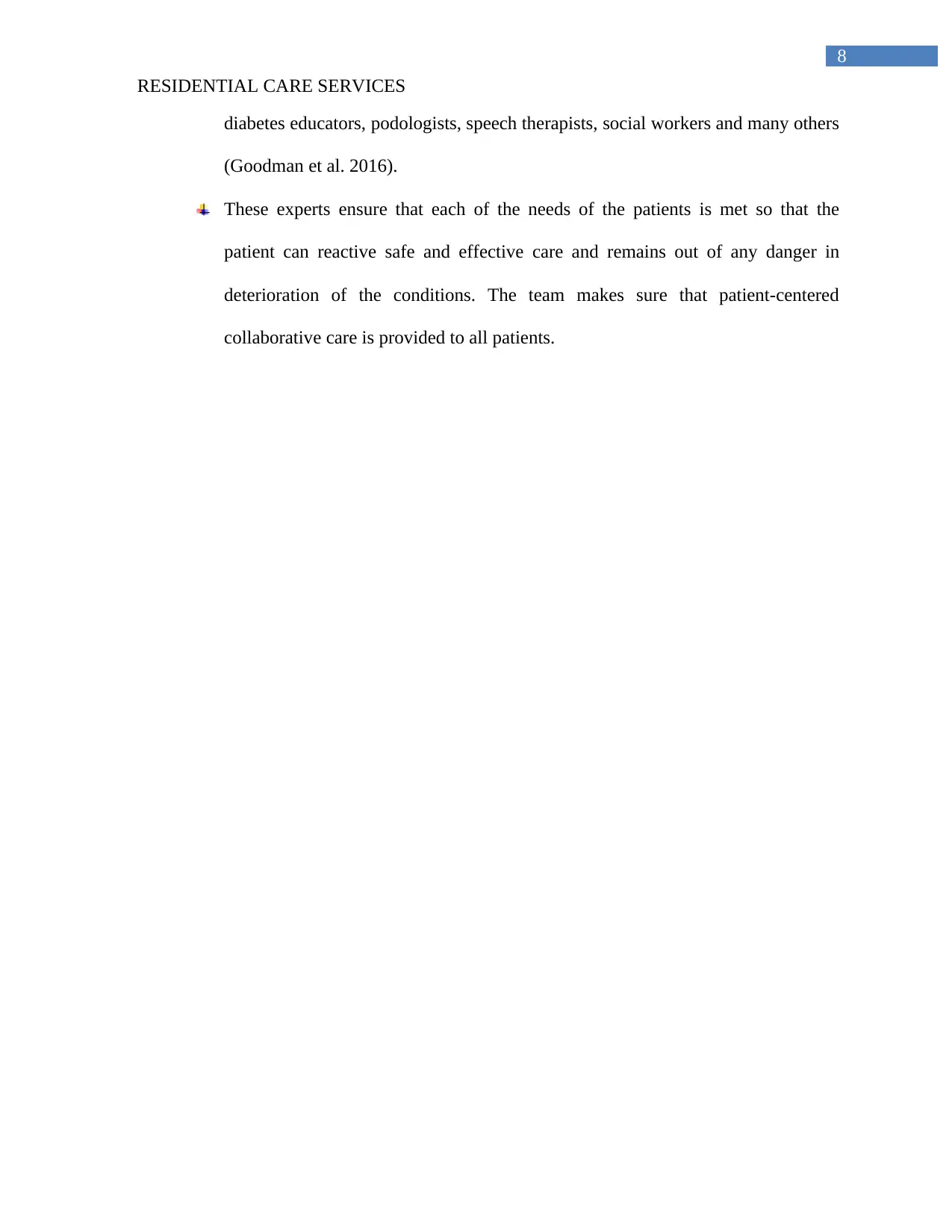
8
RESIDENTIAL CARE SERVICES
diabetes educators, podologists, speech therapists, social workers and many others
(Goodman et al. 2016).
These experts ensure that each of the needs of the patients is met so that the
patient can reactive safe and effective care and remains out of any danger in
deterioration of the conditions. The team makes sure that patient-centered
collaborative care is provided to all patients.
RESIDENTIAL CARE SERVICES
diabetes educators, podologists, speech therapists, social workers and many others
(Goodman et al. 2016).
These experts ensure that each of the needs of the patients is met so that the
patient can reactive safe and effective care and remains out of any danger in
deterioration of the conditions. The team makes sure that patient-centered
collaborative care is provided to all patients.
⊘ This is a preview!⊘
Do you want full access?
Subscribe today to unlock all pages.

Trusted by 1+ million students worldwide
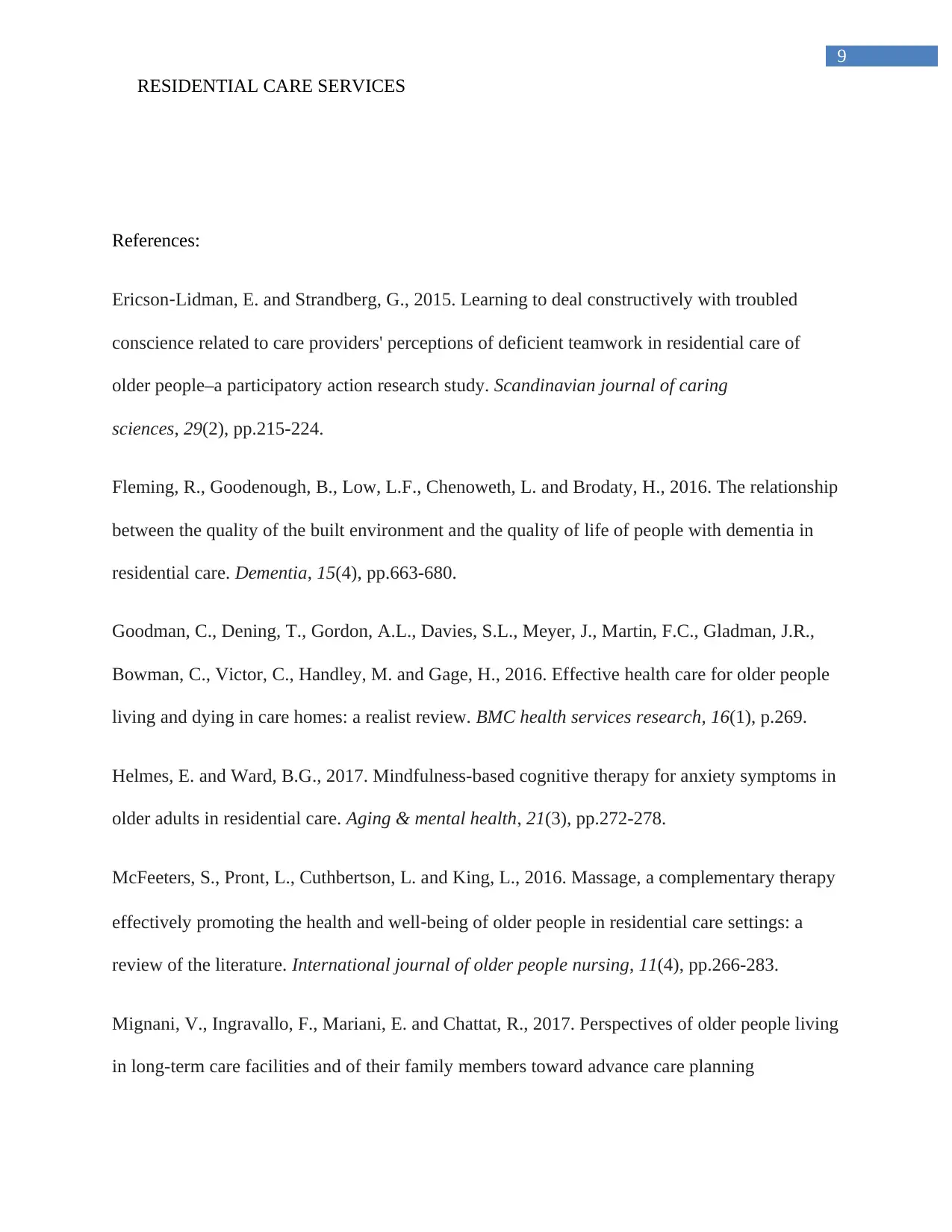
9
RESIDENTIAL CARE SERVICES
References:
Ericson‐Lidman, E. and Strandberg, G., 2015. Learning to deal constructively with troubled
conscience related to care providers' perceptions of deficient teamwork in residential care of
older people–a participatory action research study. Scandinavian journal of caring
sciences, 29(2), pp.215-224.
Fleming, R., Goodenough, B., Low, L.F., Chenoweth, L. and Brodaty, H., 2016. The relationship
between the quality of the built environment and the quality of life of people with dementia in
residential care. Dementia, 15(4), pp.663-680.
Goodman, C., Dening, T., Gordon, A.L., Davies, S.L., Meyer, J., Martin, F.C., Gladman, J.R.,
Bowman, C., Victor, C., Handley, M. and Gage, H., 2016. Effective health care for older people
living and dying in care homes: a realist review. BMC health services research, 16(1), p.269.
Helmes, E. and Ward, B.G., 2017. Mindfulness-based cognitive therapy for anxiety symptoms in
older adults in residential care. Aging & mental health, 21(3), pp.272-278.
McFeeters, S., Pront, L., Cuthbertson, L. and King, L., 2016. Massage, a complementary therapy
effectively promoting the health and well‐being of older people in residential care settings: a
review of the literature. International journal of older people nursing, 11(4), pp.266-283.
Mignani, V., Ingravallo, F., Mariani, E. and Chattat, R., 2017. Perspectives of older people living
in long-term care facilities and of their family members toward advance care planning
RESIDENTIAL CARE SERVICES
References:
Ericson‐Lidman, E. and Strandberg, G., 2015. Learning to deal constructively with troubled
conscience related to care providers' perceptions of deficient teamwork in residential care of
older people–a participatory action research study. Scandinavian journal of caring
sciences, 29(2), pp.215-224.
Fleming, R., Goodenough, B., Low, L.F., Chenoweth, L. and Brodaty, H., 2016. The relationship
between the quality of the built environment and the quality of life of people with dementia in
residential care. Dementia, 15(4), pp.663-680.
Goodman, C., Dening, T., Gordon, A.L., Davies, S.L., Meyer, J., Martin, F.C., Gladman, J.R.,
Bowman, C., Victor, C., Handley, M. and Gage, H., 2016. Effective health care for older people
living and dying in care homes: a realist review. BMC health services research, 16(1), p.269.
Helmes, E. and Ward, B.G., 2017. Mindfulness-based cognitive therapy for anxiety symptoms in
older adults in residential care. Aging & mental health, 21(3), pp.272-278.
McFeeters, S., Pront, L., Cuthbertson, L. and King, L., 2016. Massage, a complementary therapy
effectively promoting the health and well‐being of older people in residential care settings: a
review of the literature. International journal of older people nursing, 11(4), pp.266-283.
Mignani, V., Ingravallo, F., Mariani, E. and Chattat, R., 2017. Perspectives of older people living
in long-term care facilities and of their family members toward advance care planning
Paraphrase This Document
Need a fresh take? Get an instant paraphrase of this document with our AI Paraphraser
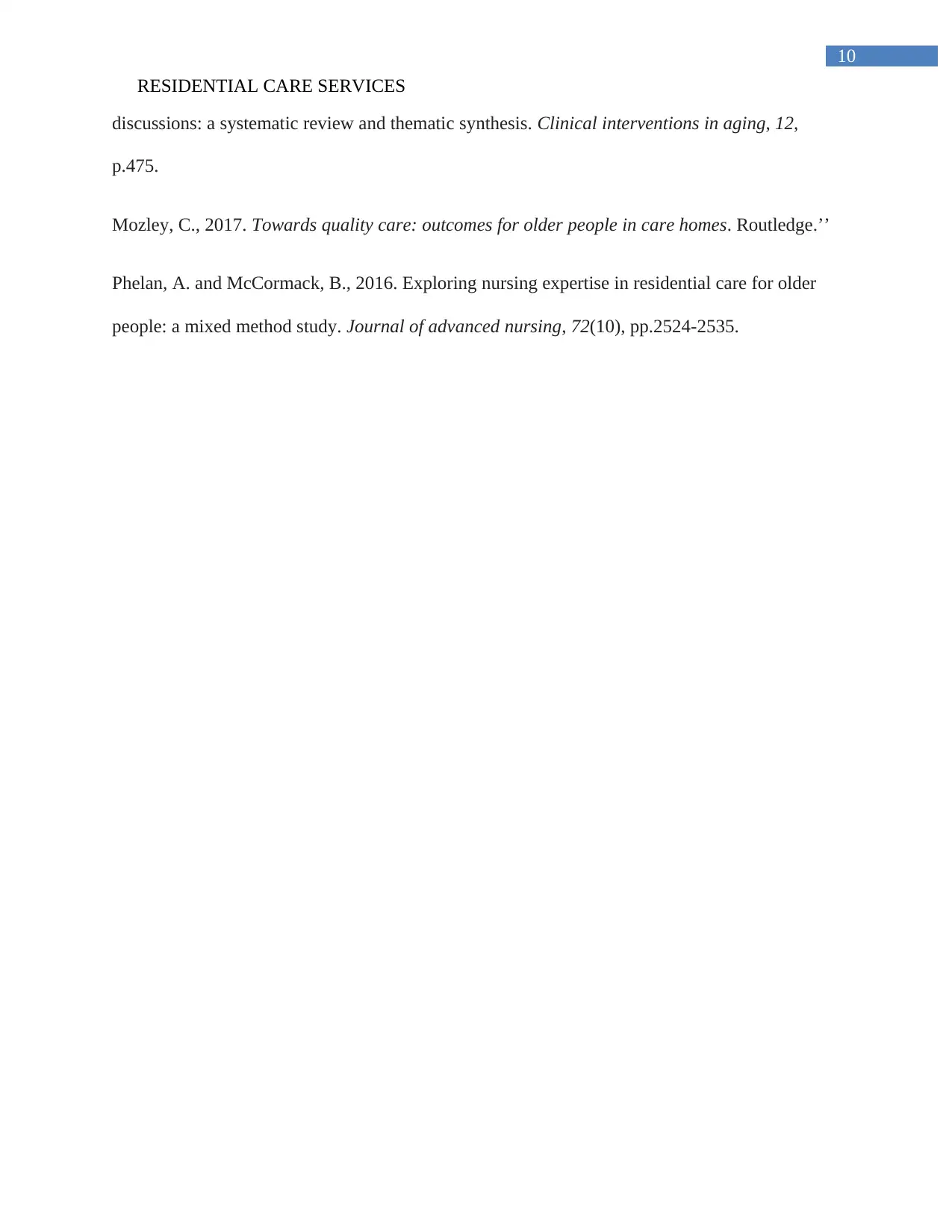
10
RESIDENTIAL CARE SERVICES
discussions: a systematic review and thematic synthesis. Clinical interventions in aging, 12,
p.475.
Mozley, C., 2017. Towards quality care: outcomes for older people in care homes. Routledge.’’
Phelan, A. and McCormack, B., 2016. Exploring nursing expertise in residential care for older
people: a mixed method study. Journal of advanced nursing, 72(10), pp.2524-2535.
RESIDENTIAL CARE SERVICES
discussions: a systematic review and thematic synthesis. Clinical interventions in aging, 12,
p.475.
Mozley, C., 2017. Towards quality care: outcomes for older people in care homes. Routledge.’’
Phelan, A. and McCormack, B., 2016. Exploring nursing expertise in residential care for older
people: a mixed method study. Journal of advanced nursing, 72(10), pp.2524-2535.
1 out of 11
Related Documents
Your All-in-One AI-Powered Toolkit for Academic Success.
+13062052269
info@desklib.com
Available 24*7 on WhatsApp / Email
![[object Object]](/_next/static/media/star-bottom.7253800d.svg)
Unlock your academic potential
Copyright © 2020–2025 A2Z Services. All Rights Reserved. Developed and managed by ZUCOL.





